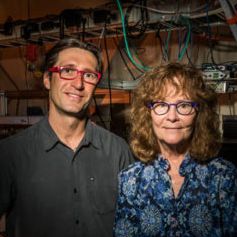
Berkeley Lab scientists Michal Hammel and Carolyn Larabell in front of the SIBYLS Beamline at the Advanced Light Source. (Credit: Paul Mueller/Berkeley Lab)
Scientists have revealed that the supercoiling of bacterial chromosomes around histone-like proteins can trigger the expression of genes that make the microbe invasive. The discovery could provide a new target for the development of drugs to prevent or treat bacterial infection. Read more on the Berkeley Lab News Center.
The study lead author Michal Hammel, research scientist in the Molecular Biophysics & Integrated Bioimaging (MBIB) Division, teamed up with MBIB faculty scientist Carolyn Larabell, both pictured above.




